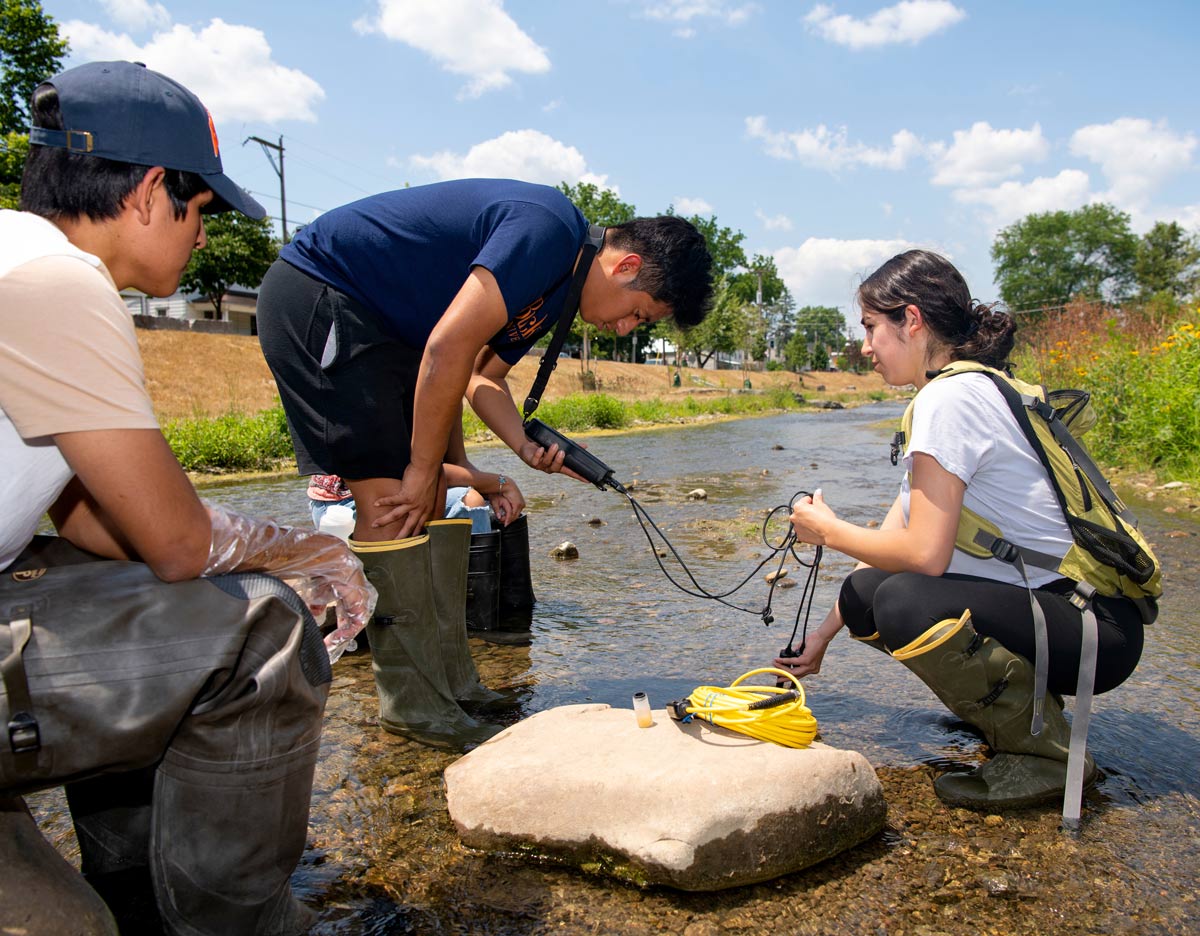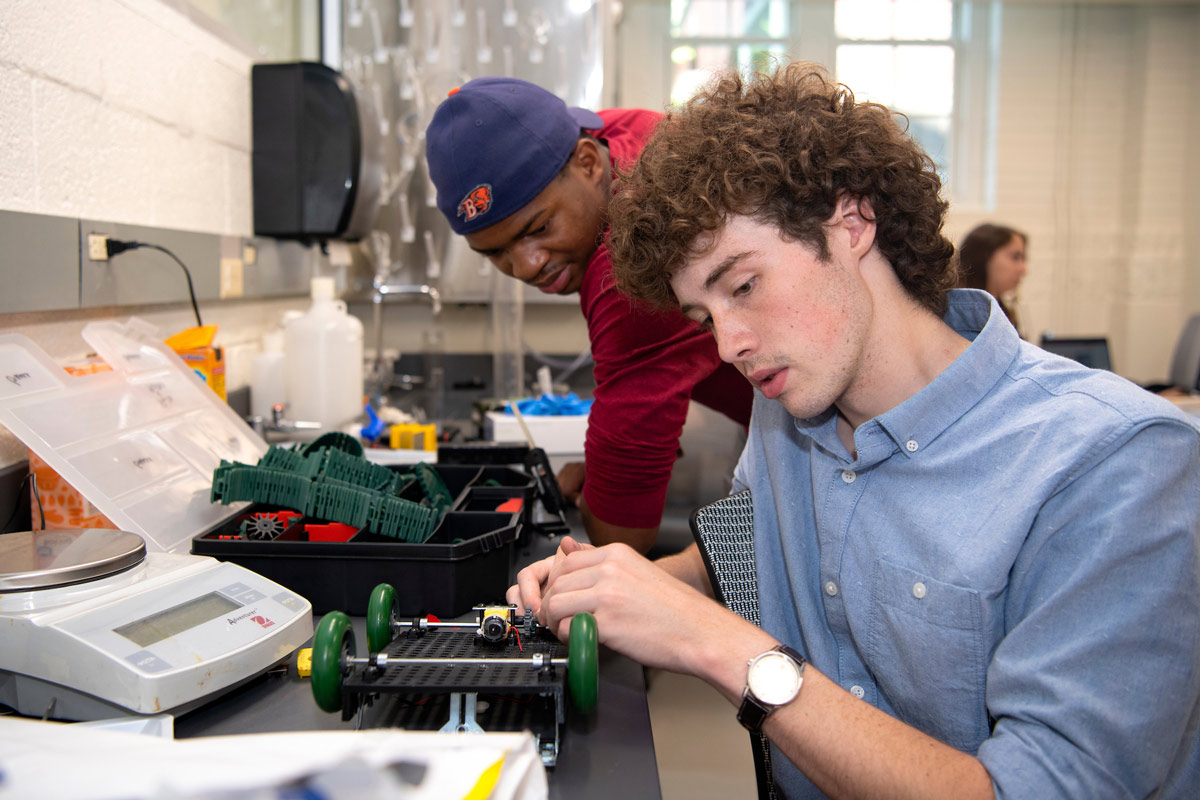How to Excel
t was mid-July when Morgan Powell ’26 first made the robot’s finger move. On the table in front of her, a 3D- printed piece attached to an actuator — a flexible mechanical device that can be inflated to change the shape of something — bent like a finger. “It functions through air sent from a pump, which is manipulated using an Arduino,” Powell says, using the brand name for a small, single-board microcontroller. “Compared to some of the other models that have been designed, this one is a bit thicker and doesn’t curve as much. We’re going to make it thinner and add more chambers to increase the curvature and improve its strength.”
Within just weeks, Powell and three of her peers would accomplish their goal of creating a handlike soft robotic device that could lift a weighted cup — research aimed at improving the lives of those who rely on prosthetic limbs.
Watching Powell explain her team’s design and effortlessly manipulate the digital model she built using Fusion 360 software, one could easily mistake her for a rising junior or senior doing summer research. But the Weyers Cave, Va., native and 17 other first-year students from across the country had never studied in a college lab before. Instead, they were jumping headfirst into life as Bucknell engineers through the Engineering EXCELerator program.
They designed robots, built chemically driven cars, created and tested new home air filtration methods, examined water quality parameters to determine recreational safety, and explored how virtual reality can be used to expand the classroom.
The Engineering EXCELerator program kick-starts the classroom experience for first-year students, inviting them to dive into team-based design projects, train on makerspace tools and take introductory coursework before the start of their first semester. Funded by the generosity of donor partners and open to students from all backgrounds, the endowed program offers a foundational engineering experience at no cost to students.
Erin Jablonski, associate dean of engineering, led the development of the program in 2021 with a clear vision of providing early exposure to engineering concepts. “The program helps students build academic and social capital and sets them on a trajectory for success,” she says. “And because the students are from a wide variety of geographical locations, high school environments, intended majors and prior experiences with design and prototyping, the program doesn’t do just one thing or fill one need. It is meant to bring a broad pool of great students together to work toward common goals.”


A Hands-on Head Start
Students work on projects with faculty advisers, putting the design and prototyping skills they acquire as part of the EXCELerator program into practice. For Joshua Raeter ’26, who was part of the cohort working with Professors Deborah Sills and Carley Gwin on a water-filtration system, EXCELerator offered a first look at the application of material he’d learned in his Princeton, N.J., high school. “I was taught a lot of theoretical and technical information in lectures,” he says. “But now, I’m seeing it all applied in a lab. I’m going to focus on environmental engineering, so this project is teaching me skills that I’ll use in my major.”
In addition to the project work, participants build their physics and calculus knowledge with classroom instruction, and learn the lay of the land on campus and in the engineering facilities.
“It’s really obvious that the whole point of this program is to make sure we’re well prepared for fall semester,” says Powell. “We’re getting certified on the technology, taking classes, learning the campus and making friends. It’s helping us develop a really solid foundation so that we’re completely comfortable here.”
For Omuhle Ndhlovu ’26, having the extra time to adjust to life as a Bucknell engineer was doubly beneficial. Hailing from Bulawayo, Zimbabwe, Ndhlovu was able to not only gain familiarity with the campus and resources in the College of Engineering through the program, but also to adjust to a wholly unfamiliar culture, since she arrived on campus early to take part. “It’s important for me, socially, to get to be here,” she says. “I’m learning all about the cultural dynamics. It’s been very eye-opening and helpful.”
In just its second year, the EXCELerator program has already influenced some students’ decision to say “yes” to Bucknell. Powell was strongly swayed to accept her offer of admission by the outreach she received about the program. “The number of professors that invited me here was wonderful,” she says. “They made promises and fulfilled them. Before even starting my first semester, I’m here in this great environment; learning, making connections and being an engineer.”
Coming to Bucknell from Los Angeles, Jonathan Cabrera ’26 saw how the program filled the gaps. “My school didn’t have the most resources, and EXCELerator made it possible for me to learn what I couldn’t in high school,” he says. “I’ll be more comfortable when the semester starts because I have the same foundation as many of my peers.”


Empowering Future Engineers
Jablonski saw last year’s participants — many of whom share Cabrera’s experience — quickly become leaders in and out of the classroom. With two years of success serving as a foundation, she has high hopes for the ways the program will continue empowering new Bucknellians.
“My hope for the future is to sustain this program so that at least 10% of each incoming engineering class is recruited to join the EXCELerator cohort,” she says. “These students are well-equipped and prepared for Engineering 100, physics and calculus; have the time management skills to succeed in their courses; and are comfortable on campus. It all combines to give them a sense of accomplishment and belonging that makes them a great resource for their peers.”